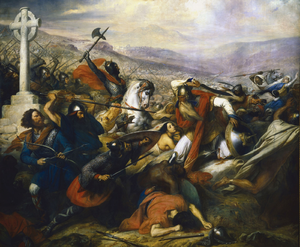Umayyad invasion of Gaul
| Umayyad invasion of Gaul | |||||||||||
|---|---|---|---|---|---|---|---|---|---|---|---|
| Part of Early Muslim conquests | |||||||||||
 The Battle of Tours in 732, depicts a triumphant Charles Martel (mounted) facing Abdul Rahman Al Ghafiqi (right) at the Battle of Tours. Painting (1837) by Charles de Steuben. |
|||||||||||
|
|||||||||||
| Belligerents | |||||||||||
| Andalusi commanders (as of 750) | Septimania | Aquitanians Gascons (Basques) | Kingdom of the Lombards | ||||||||
| Commanders and leaders | |||||||||||
|
Al-Samh ibn Malik al-Khawlani † Abdul Rahman Al Ghafiqi † Yusuf ibn 'Abd al-Rahman al-Fihri |
Ardo † Maurontus Ansemund † |
Odo of Aquitaine Hunald of Aquitaine Waifer of Aquitaine † |
Charles Martel Childebrand Liutprand Pepin the Short |
||||||||
Frankish victory:
The Umayyad invasion of Gaul followed the Umayyad conquest of Hispania spearheaded by the North African commander Tariq ibn Ziyad in 711. During the 8th century, Muslim Umayyad armies conquered the region of Septimania, the last remnant of the Visigothic Kingdom.
The Umayyad advance was stopped at the Battle of Toulouse in 721, but they sporadically raided Southern Gaul as far as Avignon, Lyon, and Autun. After the 732 Battle of Tours-Poitiers, the Franks checked Aquitanian sovereignty, and reasserted their authority over Burgundy, but only later in 759 did they manage to take the Mediterranean region of Septimania, due to Andalusi neglect and local Gothic disaffection.
By 716, under the pressure of the Muslims from the south, the Kingdom of the Visigoths had been rapidly reduced to the province of Septimania, a region which corresponds approximately to the modern Languedoc-Roussillon. By 717, the Umayyads under al-Hurr ibn Abd al-Rahman al-Thaqafi started to cross the eastern Pyrenees into Aquitanian territory and Septimania as a continuation to their Iberian conquest, but the commander failed to advance further.
After being replaced by al-Samh, Arab-Berber forces seized Barcelona and the Septimanian city of Narbonne (Arbouna for the Arabs) in 719 despite local resistance. A sizable number of the town defenders and inhabitants were killed in the aftermath by the victorious Umayyad forces. From 720 on, Narbonne became the capital city of Muslim Septimania, and used as a base for razzias. A mosque was established in Narbonne, inside the church of Sainte-Rustique.
...
Wikipedia
